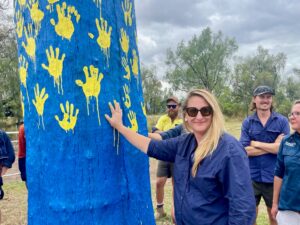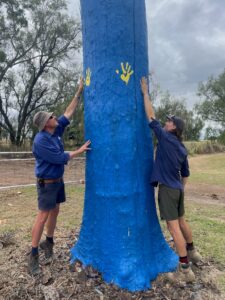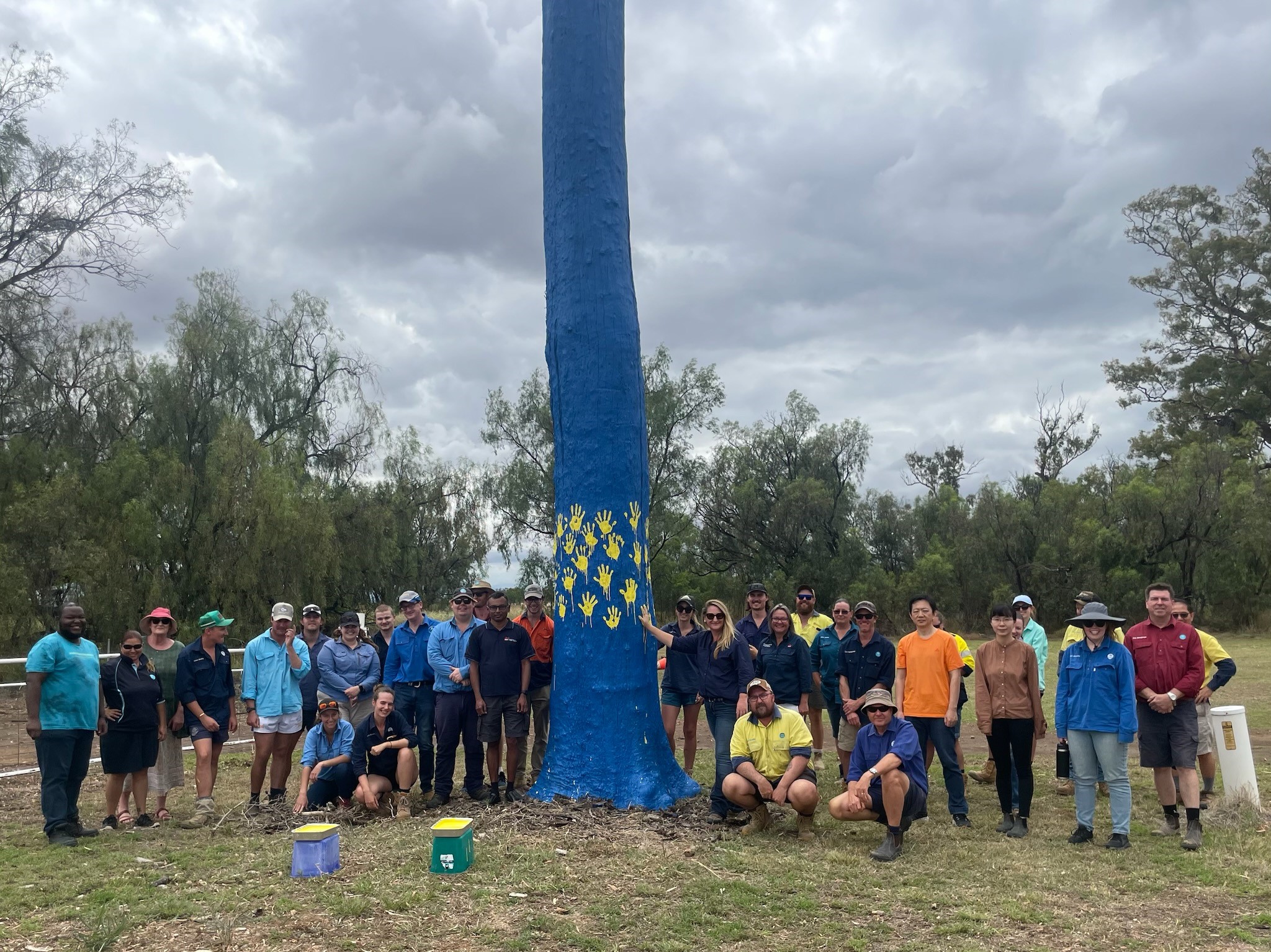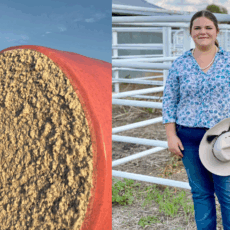A lone blue tree, with a ring of striking yellow handprints can be seen standing between the Australian Cotton Research Institute (ACRI) and the Kamilaroi Highway between Narrabri and Wee Waa.
It’s impressive in height and blueness and though the dead tree stands in the stark countryside, its message aims to be a living reminder, that no matter how isolated you feel, you are not alone.
The Commonwealth Scientific and Industrial Research Organisation (CSIRO) and the Department of Primary Industries (DPI) staff are confronting community mental health hand in hand at the ACRI, most recently with a ‘Caring for our mental well-being and supporting our community’ seminar and blue tree hand printing activity.
On Thursday, November 23, Rural Adversity and Mental Health Program (RAMHP) coordinator, Letitia Cross delivered a down-to-earth presentation on the importance of mental health literacy in a rural environment.
The intention of the activity was not just to strengthen the mental health of their staff, but the wider regional community, and this time CSIRO and DPI came together to discuss being proactive about mental health and confront the stigma around asking for help early.
“Today was exciting because everyone at ACRI has come together –and not as a one-off,” said Mrs Cross.
“In rural areas, we often don’t have language around mental health because we’ve never had the conversation.
“So, this program helps give us literacy in it and allows us to have conversations and normalise it, and to break down the stigma and the culture we’ve created around stoicism and toughness.
“And there are great things about the strength of rural communities but the double-edged sword of it is that we see emotions as being equated to weakness and weakness is punished.”
Before the rain came in, the two organisations headed out to dip their hands in yellow paint and add handprints in a ‘Hand in Hand’ ceremony, as part of their Blue Tree project.
“Today was a fantastic example of the success that you can have in this space when the community comes together to support one another,” said Mrs Cross.
“We know painting a tree doesn’t change anything but what it does is help start the conversation and raise that support within the community, and when we do that hand in hand like we have at ACRI today, that’s how we change the culture.”

Rural Adversity and Mental Health Program coordinator Letitia Cross.
One thousand blue trees stand on every continent (minus Antarctica, according to the Blue Tree project website) and the mission was founded with the intention to spark difficult conversations and encourage people to speak up when experiencing mental health concerns.
With the help of Mrs Cross and RAMHP, the two organisations will continue to organise activities that maintain and strengthen staff mental well-being.
Their first activity in the new year will be to put up a sign next to the blue tree stating their support for the community.
CSIRO (Myall Vale) Deputy site leader Sandra Williams is pleased to see everyone actively participating in the cause, especially when staff had instigated the fabulous idea of joining the Blue Tree project.
“We had a lanky dead tree between here and the main Kamilaroi highway, and a few of the guys here said, ‘Let’s get involved in the Blue Tree project and paint it blue in support of the community and how the community has been affected numerous times by mental illness,” said Mrs Williams.
“That is one part of things we’ve been doing for quite some time now, focusing on health and safety, not just physical but getting people thinking about looking after their mental health and learning the skills to navigate how they’re feeling.”
It was Alan Thompson, team leader of the plant breeding program who contemplated the significance of the Blue Tree project to the surrounding community while on his long driving trips.
“While travelling, I see many blue trees on the side of the road, and I started to reflect on the difficulty of long travel, and what the people who painted the trees must be facing,” said Mr Thompson.
“I thought, people must get stuck in their minds and think a lot on the road, and this would be a great way to show our support for the community, and anyone passing by our facilities.
“We have a beautiful tree out the front that we can paint, that could make people aware that mental illness and depression do happen around here, especially during the drought.”
“It’s hard trying to juggle work and family, now every time I see that tree I stop and think about things – it makes you stop and reflect.”
During the mental health literacy talk, the group was shocked to hear that one in five Australians suffer from mental disorders, with a rural man being three times more likely to take his own life by suicide than in urban areas.
“What stats like that tell us is that we need to go upstream and stop pulling people out when they’re falling into a bad place, we need to look at how to get in early so people ask for help,” said Mrs Cross.
Mrs Cross thought it was a great credit to CSIRO and DPI to come together to form an ongoing relationship with RAMHP and considered the group to be leading rural workforce mental health by example.
“This should be the standard in the workplace, and in the community – that you’re worth the investment of putting time into looking after your mental health and knowing to ask for help before it gets to more acute stages like depression.”
“That’s how we get people to help, that’s how we change people being in more serious stages before they ask for help and that’s how we stem our suicide rate.”
If you are someone you know needs help contact Lifeline 13 11 14 or lifeline.org.au











